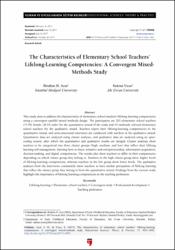| dc.contributor.author | Acar, İbrahim Hakkı | |
| dc.contributor.author | Ucuş, Şükran | |
| dc.date.accessioned | 10.07.201910:49:13 | |
| dc.date.accessioned | 2019-07-10T19:51:56Z | |
| dc.date.available | 10.07.201910:49:13 | |
| dc.date.available | 2019-07-10T19:51:56Z | |
| dc.date.issued | 2017 | en_US |
| dc.identifier.citation | Acar, İ. ve Uçuş, Ş. (2017). The characteristics of elementary school teachers' lifelong-learning competencies: A convergent mixed-methods study. Educational Sciences-Theory & Practice, 17(6), 1833-1852. https://dx.doi.org/10.12738/estp.2017.6.0082 | en_US |
| dc.identifier.issn | 1303-0485 | |
| dc.identifier.issn | 2148-7561 | |
| dc.identifier.uri | https://dx.doi.org/10.12738/estp.2017.6.0082 | |
| dc.identifier.uri | https://hdl.handle.net/20.500.12511/2311 | |
| dc.description | WOS: 000426378500003 | en_US |
| dc.description.abstract | This study aims to address the characteristics of elementary school teachers' lifelong-learning competencies using a convergent parallel mixed methods design. The participants are 203 elementary school teachers (71.9% female, 28.1% male) for the quantitative strand of the study and 25 randomly selected elementary school teachers for the qualitative strand. Teachers report their lifelong-learning competencies in the quantitative strand, and semi-structured interviews are conducted with teachers in the qualitative strand. Quantitative data are analyzed using cluster analyses, and qualitative data are analyzed using an open-coding system, after which the quantitative and qualitative results are merged. Cluster analyses show teachers to be categorized into three cluster groups (high, medium, and low) that reflect their lifelong learning self-management, learning-how-to-learn, initiative and entrepreneurship, information acquisition, decision-making, and digital competencies. The results also show teachers to differ in their competencies depending on which cluster group they belong to. Teachers in the high cluster group show higher levels of lifelong learning competencies, whereas teachers in the low group show lower levels. The qualitative analyses from the interviews consistently show teachers to have similar perceptions of lifelong learning that reflect the cluster group they belong to from the quantitative strand. Findings from the current study highlight the importance of lifelong learning competencies in the teaching profession. | en_US |
| dc.language.iso | eng | en_US |
| dc.publisher | Edam | en_US |
| dc.rights | info:eu-repo/semantics/openAccess | en_US |
| dc.subject | Lifelong Learning | en_US |
| dc.subject | Elementary School Teachers | en_US |
| dc.subject | Convergent Study | en_US |
| dc.subject | Professional Development | en_US |
| dc.subject | Teaching Profession | en_US |
| dc.title | The characteristics of elementary school teachers' lifelong-learning competencies: A convergent mixed-methods study | en_US |
| dc.type | article | en_US |
| dc.relation.ispartof | Educational Sciences-Theory & Practice | en_US |
| dc.department | İstanbul Medipol Üniversitesi, Eğitim Fakültesi, Temel Eğitim | en_US |
| dc.authorid | 0000-0003-4007-5691 | en_US |
| dc.identifier.volume | 17 | en_US |
| dc.identifier.issue | 6 | en_US |
| dc.identifier.startpage | 1833 | en_US |
| dc.identifier.endpage | 1852 | en_US |
| dc.relation.publicationcategory | Makale - Uluslararası Hakemli Dergi - Kurum Öğretim Elemanı | en_US |
| dc.identifier.doi | 10.12738/estp.2017.6.0082 | en_US |
| dc.identifier.wosquality | Q4 | en_US |
| dc.identifier.scopusquality | Q3 | en_US |


















